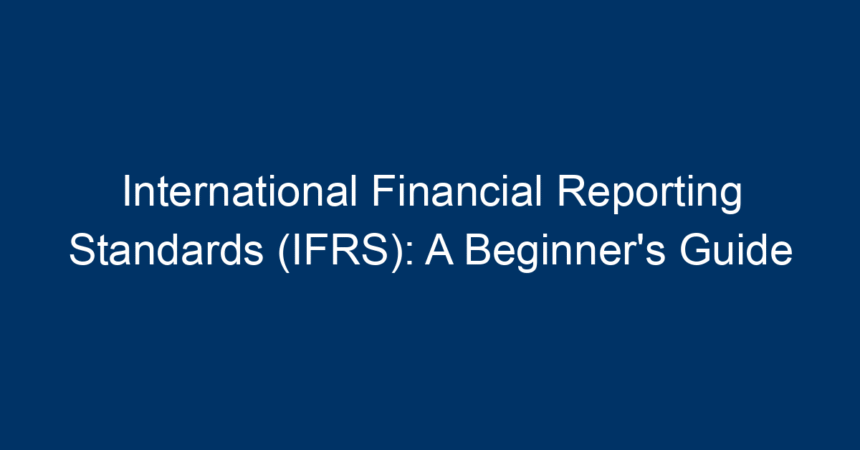The world of finance and accounting is vast and constantly evolving. As globalization continues to connect economies, businesses must navigate the distinct accounting frameworks used across borders. One of the most significant frameworks is the International Financial Reporting Standards (IFRS). For beginners, understanding IFRS is crucial for navigating this complex landscape. This guide aims to demystify IFRS, exploring its purpose, structure, benefits, and how it impacts businesses worldwide.
What Are International Financial Reporting Standards (IFRS)?
Definition and Purpose
International Financial Reporting Standards (IFRS) are designed to bring consistency, transparency, and accountability to financial statements across different regions. Developed and maintained by the International Accounting Standards Board (IASB), these standards provide a global framework for financial reporting, making it easier for investors, regulators, and other stakeholders to understand corporate financial statements.
History of IFRS
The journey of IFRS began in the late 20th century, with countries striving for a unified accounting language. The IASB was established in 2001, building upon earlier standards (International Accounting Standards or IAS) and paving the way for a more standardized approach. Today, IFRS is adopted by over 140 countries worldwide, further promoting global consistency.
Key Components of IFRS
Understanding IFRS involves recognizing its key components, which include principles, frameworks, and guidelines.
Principles of IFRS
- Relevance: Financial information must be relevant to the decision-making needs of users.
- Faithful Representation: Information presented must accurately reflect the economic reality of the transactions it describes.
- Comparability: Financial statements should be prepared in a way that allows users to compare with previous periods and other entities.
- Verifiability: Information should be supported by evidence to ensure credibility.
- Timeliness: Reports should be released promptly to remain relevant.
- Understandability: Information must be presented clearly, ensuring that all users can comprehend the content.
The IFRS Framework
The IFRS Framework outlines the concepts underlying financial reporting. It identifies who the primary users of financial statements are—primarily investors, lenders, and other creditors—and clarifies the objectives of general-purpose financial reporting. This framework serves as a foundation upon which specific standards are built.
Key IFRS Standards
IFRS 1: First-time Adoption of IFRS
This standard provides guidance for entities adopting IFRS for the first time, ensuring a smooth transition from local accounting standards.
IFRS 9: Financial Instruments
IFRS 9 addresses the classification and measurement of financial assets and liabilities. It requires entities to categorize their financial instruments based on their cash flow characteristics and the entity’s business model.
IFRS 15: Revenue from Contracts with Customers
This standard outlines how to recognize revenue from contracts, ensuring that it reflects the transfer of goods and services to customers at an amount that the entity expects to receive.
IFRS 16: Leases
IFRS 16 introduces a single accounting model for leases, effectively eliminating the distinction between operating and finance leases for lessees. This brings most lease obligations on to the balance sheet, providing a clearer picture of a company’s liabilities.
Benefits of IFRS
Adopting International Financial Reporting Standards (IFRS) presents numerous advantages for companies, investors, and regulators alike.
Enhanced Comparability
With IFRS, investors can easily compare financial statements of companies across different countries, facilitating informed investment decisions. This is particularly important for multinational companies that operate in various jurisdictions.
Increased Transparency
IFRS promotes transparency in financial reporting. By adhering to standardized guidelines, businesses provide stakeholders with clearer insights into their financial health.
Improved Access to Capital
Companies that comply with IFRS may find it easier to attract investors—both domestic and international. Investors often prefer IFRS-compliant companies due to their reliability and comprehensibility.
Better Risk Management
IFRS encourages companies to assess and report their risks and uncertainties, leading to improved risk management strategies and practices.
Challenges of IFRS Adoption
While IFRS offers numerous benefits, navigating its complexities can present several challenges, especially for beginners.
Complexity of Standards
With over 15 different IFRS standards, newcomers may find the sheer volume and detail daunting. Understanding the nuances of each standard requires time and dedication.
Costs of Implementation
Transitioning to IFRS may entail significant costs in terms of training, data gathering, and system upgrades. Companies must invest in education and technological resources to ensure compliance.
Resistance to Change
Organizations accustomed to local accounting standards may face cultural and procedural resistance when transitioning to IFRS. This can affect morale and productivity during the implementation process.
Steps to Implement IFRS
For those keen on adopting International Financial Reporting Standards (IFRS), here are actionable steps to guide the process.
1. Understanding the Standards
Begin by thoroughly familiarizing yourself with IFRS standards. Numerous resources, including online courses and official IASB publications, can provide valuable insights.
2. Assessing Current Practices
Conduct an in-depth assessment of the existing accounting practices in your organization. Identifying gaps between current standards and IFRS requirements will help shape your implementation strategy.
3. Training Staff
Invest in training sessions for your accounting and finance team. This ensures they are well-equipped to handle the transition and maintain compliance moving forward.
4. Updating Policies and Procedures
Revise internal policies and procedures to align with IFRS requirements. This may involve adjusting financial reporting processes and enhancing data collection methods.
5. Continuous Monitoring and Improvement
After initial implementation, it’s essential to monitor compliance continuously. Stay updated with any changes in IFRS standards and adjust your practices accordingly.
Conclusion
International Financial Reporting Standards (IFRS) serve as a vital framework for financial reporting in a globalized economy. By promoting consistency, transparency, and accountability, IFRS enhances the financial landscape for companies and investors alike. While the transition may come with challenges, the long-term benefits—such as improved comparability and increased access to capital—far outweigh the initial hurdles.
For those embarking on this journey, take the time to educate yourself and your organization, foster a culture of compliance, and continuously strive for improvement. Embracing IFRS will not only enhance financial reporting but also pave the way for greater success in an interconnected world.




